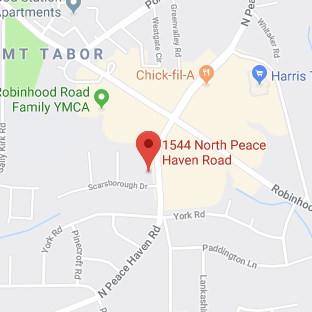Emergency Dental Care
What should I do if my child having a dental emergency?
Call our Winston-Salem or Kernersville office ASAP
If you experience a dental emergency, be sure to call our Winston-Salem or Kernersville practice as soon as possible. We are here to help you, any time, any day.
If you call after-hours, the voicemail will route you to the Doctor On-Call
If you need immediate attention after-hours, please call our office. The voicemail will give you the emergency phone number which is routed to the Doctor On-Call. When you speak to the doctor, you can send her images of your child's mouth. The doctor will examine these photos, discuss potential treatment options, and formulate a plan to keep your child comfortable until he/she is able to be seen.
If the emergency is extremely urgent (such as severe trauma to a permanent tooth), the doctor may bring you to the office for emegency treatment.
If you are unable to reach the doctor, please dial 911
If you are unable to reach a provider during an emergency and your child's well-being is compromised, please dial 911.
What are some examples of dental emergencies?
Dental emergencies typically include dental trauma, dental pain, facial swelling.
Examples of Dental Trauma
While dental trauma to baby teeth typically can wait until the following work day, some permanent tooth traumas require fast attention.
- Broken or cracked tooth
- Knocked out tooth
- Facial trauma that has repositioned or moved teeth
- Facial trauma that has loosened teeth
- Broken jaw
- Severely cut or scraped gums
- Object caught between teeth
Examples of Emergent Dental Pain
Dental pain can be an indication of a cavity or infection that is progressing, especially when any of the symptoms below are noted:
- Severe toothache (especially if it is spontaneous or keeping your child awake at night)
- Prolonged pain to cold or hot (greater than 10 seconds)
- Pain on biting (especially when biting into soft foods, such as bread)
Examples of Facial Swelling
Facial swelling caused by an infected tooth is a dental emergency. Call your dentist ASAP to schedule and examination and treatment. Facial swelling that surrounds the eye, goes below the jawline, or noted with fever, fatigue, difficulty swallowing, and/or breathing needs to be addressed immediately. An infected tooth can cause facial swelling to the following areas:
- Swelling inside the mouth
- Swelling to the cheek, eye, or nasolabial fold
- Swelling to the lower jaw or neck
What will you do during my child's emergency dental visit?
Diagnose the problem
When your dental health is at risk, we will do everything we can to make sure that you're treated as soon as possible. The first step is diagnosing the problem. One of our doctor's will complete a thorough, but efficient, exam and an x-ray (if needed)
Discuss all treatment options
Once the problem is diagnosed, the doctor will discuss all treatment options with you. If our schedule permits, or if the emergency requires immediate attention, we will complete the needed treatment.
Complete all necessary treatment to get your child out of pain
After we answered all of your questions, we will complete any necessary treatment to get your child out of pain. If your child is being seen for a fractured or broken front tooth, we will restore the area so he/she can smile with confidence.

What should I do if my child has a dental injury?
Your quick action can help healing
With dental injuries, swift action often improves outcomes. If you child is experiencing a dental injury, such as chipped tooth, knocked-out tooth, or loose tooth, call our Winston-Salem or Kernersville office immediately. If the office is open, we will schedule your child for an emergency exam. If it is after-hours, you will be forwarded to our Doctor On-Call. When you speak to the doctor, you will be able to send her pictures and discuss the most appropriate action plan.
Review our dental trauma guides
Here are some helpful trauma guildelines for parents, healthcare professionals, and dental professionals:
- Trauma Guidelines for Parents
- Trauma Guidelines for Healthcare Professionals
- Trauma Guidelines for Dental Professionals
Prevent trauma by protecting your teeth
We recommend your child wear a mouthguard during all contact sports to prevent any potential dental traumas. This includes sports such as baseball, basketball, boxing, football, field hockey, gymnastics ice hockey, lacrosse, marial arts, racquetball, rugby, track and field, skateboarding, skiing, snowboarding, skydiving, soccer, surfing, volleyball, water polo, weightlifting, or wrestling. While your child has baby teeth or is in braces, a pre-made sports guard is a great option. Once your child has all permanent teeth, we can make a custom-fit mouthguard to make breathing and speaking more comfortable.
What our parents say after we've treated their child after a dental trauma
Quickly reassured me with what to expect
"My four year old daughter bumped her mouth very hard and had a loose front tooth which turned light grey about a week later. I took her for an evaluation with Dr. Gail Rohlfing. I was offered an appoinment the next morning. The staff was very polite and professional and Dr. Rohlfing quickly reassured me and share me what to expect in the coming months with the tooth. Terrific office and great business! They are always ready to help with whatever is needed."
-Lilia J
Splinted my son's teeth after the Emergency Room doctor said there was nothing they could do
"Thanks to the incredible care of Dr. Kelly Lipp, the damage caused by a collision at a trampoline park will be minimal for my 14yo son. After being told at the ER that there was nothing they could do for my son's visibly damaged teeth, Dr. Lipp met us at the office late on Saturday night. They then provided excellent physical and emotional care to both me and my son. A couple of days later, my son's orthodontist commented that Dr. Lipp did a perfect job splinting the tooth. Dr. Lipp is now our dentist of choice and we are extremely grateful to her."
-Lisa B.
How can I take care of my child after his/her dental injury?
- Your actions may promote healing
- Keep the area clean with gentle yet thorough oral hygiene, especially along the gumline
- An antimicrobial mouth rinse may be prescribed to promote gum healing
- A soft food diet is recommended for 10 days
- Ibuprofen (i.e. Motrin) is recommended for 2 days for pain control and anti-inflammatory properties
- Any oral injuries could damage the nerve of the tooth
- If the nerve does not heal, further treatment is required
- Follow-up visits may be recommended so the dentist can make sure the area is healing appropriately
- Please call our office if you observe any of the following: darkening of the tooth, increased pain or mobility, or abscess (gum pimple above the tooth)
- If the injured tooth is a baby tooth, there is a chance the developing permanent tooth also was injured
- The best way to prevent further injury is to follow-up with the dentist as recommended
- If age-appropriate, have your child wear a mouthguard for contact sports
- If you child would like a custom-fit mouthguard to improve comfort, speaking, and breathing, we can make one at our office




